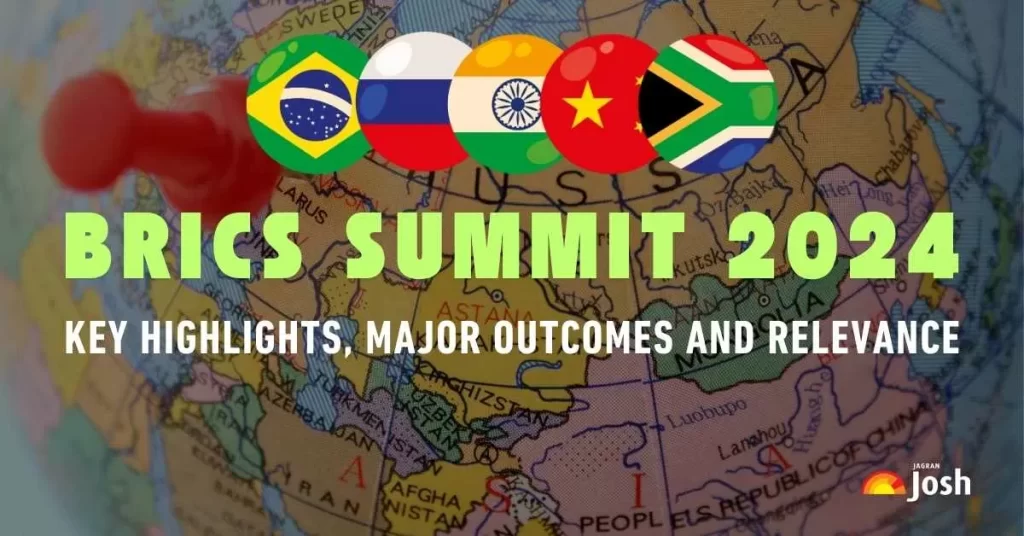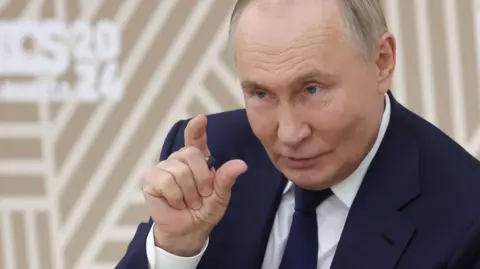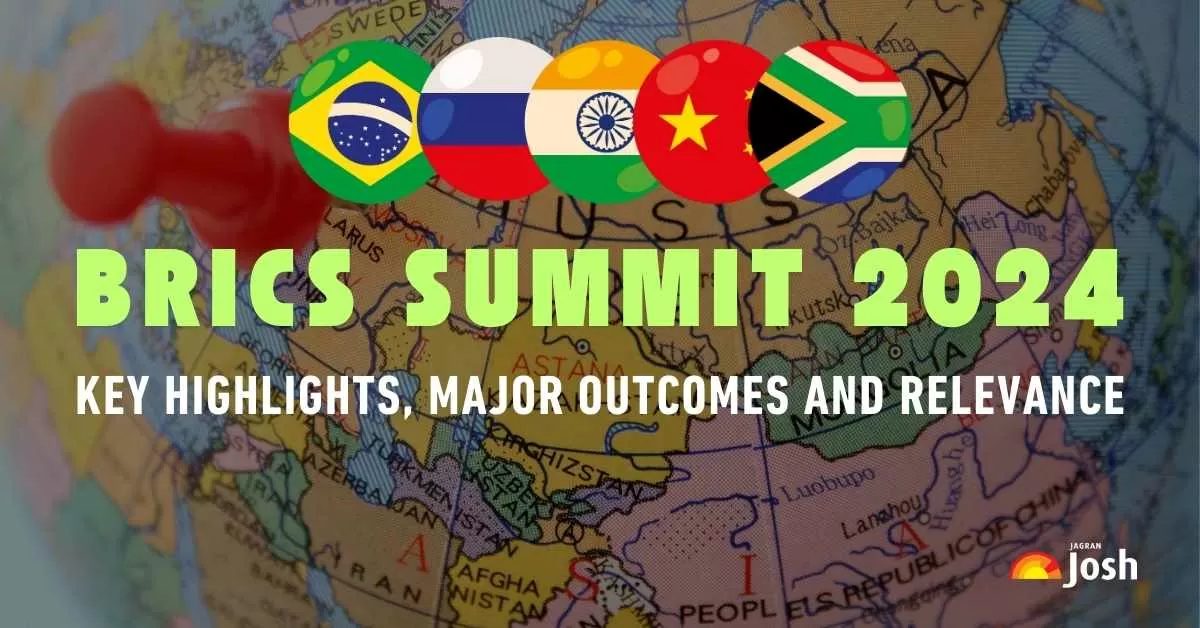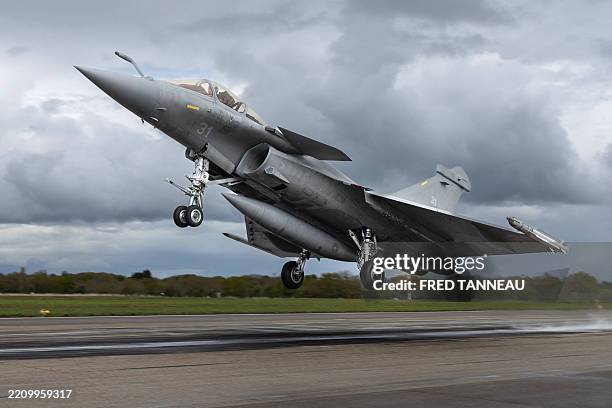BRICS Summit 2024: Key Highlights & Relevant Outcomes
Addressing the BRICS Summit 2024 in Kazan, Vladimir Putin stated that the formation of a “multipolar world order” is ongoing and irreversible. He called this change “dynamic,” speaking to leaders from nations like China and India.

The UN Secretary-General, Antonio Guterres, attended the BRICS summit, his first meeting with President Putin in over two years.
Prime Minister Narendra Modi met Russian President Vladimir Putin during the 16th BRICS Summit in Kazan. Modi invited Putin to visit India next year for the 23rd India-Russia Annual Summit.
According to a statement from the Prime Minister’s Office, the two leaders explored avenues for collaboration across various sectors, including politics, economics, defence, energy, and cultural exchanges.
According to Reuters, Russia supported China and Brazil’s Ukraine peace initiatives. Interfax reported that these proposals were discussed during bilateral meetings held on the sidelines of the BRICS summit in Kazan.
Around 20 leaders, including representatives from China, India, Turkey, and Iran, gathered in Kazan to deliberate on key issues such as creating a BRICS-led international payment system and addressing the ongoing conflict in the Middle East.
Expanding the use of Local currencies to Promote Economic Stability
BRICS leaders have reaffirmed their commitment to strengthening financial cooperation and expanding the use of local currencies to enhance economic stability and drive development.
In a press release from the Ministry of External Affairs, the Kazan Declaration, titled “Strengthening Multilateralism for Just Global Development and Security,” outlined these priorities following the BRICS Summit on Wednesday.
Putin returns to the world stage hosting 36 leaders at the BRICS summit in Russia
West was infuriated as the UN secretary-general accepted the invitation to the meeting of countries including China, India and Iran
Vladimir Putin, ostracised by the West and labelled a possible war criminal by the international criminal court, has played host to 36 world leaders from nations including China, India and Iran as part of a summit of the BRICS group designed to display Moscow as anything but isolated.
One of the main aims of the summit was to speed up ways to reduce the number of dollar transactions, and so mitigate the US ability to use the threat of sanctions to seek to impose its political will.
Moscow said the representatives from 36 countries were attending parts of the three-day meeting, making it the largest international gathering hosted by Putin since he ordered the full-scale invasion of Ukraine in February 2022. Russia is this year’s chair of the group.
The Chinese president, Xi Jinping, greeted Putin in Kazan as his dear friend, praising the “profound” friendship between the two countries. He said: “The world is undergoing profound changes unseen in a century, and the international situation is chaotic and intertwined.”
China-Russia ties have “injected strong impetus into the development, revitalisation and modernisation of the two countries,” the Chinese leader said.
Putin said he wanted to strengthen ties with China to bring greater global stability. “We intend to further increase coordination in all multilateral platforms to ensure global security and a just world order,” he told Xi.
The Indian prime minister, Narendra Modi, said he wanted the Ukraine conflict resolved quickly and peacefully. Modi visited Kyiv in August and Moscow in July to encourage talks, casting Delhi as a potential peacemaker, but there have been few developments since.
Cyril Ramaphosa, the South African president, who has also sought to play the role of mediator in the conflict, praised Moscow as a “valued ally” and friend “who supported us from the very beginning in the fight against apartheid”.
Putin, speaking on Tuesday with the president of the BRICS New Development Bank, Dilma Rousseff, said the use of local currencies instead of the dollar or euro “helps to keep economic development free from politics as far as possible in the context of today’s world”.
Russia claims the group now represents the global majority that can make up a substantial element of a coming new global order.
The Brics group has already expanded from its five members – South Africa, Russia, China, Brazil and India – to a broader group including Egypt, and the United Arab Emirates. Ethiopia and Iran. Argentina applied and then withdrew after its presidential elections.
Egypt’s president, Abdelfattah al-Sisi, hailed Russian support for Egypt’s economic projects when he met Putin. Chief among them, Sisi said, was Egypt’s first nuclear power plant at El-Dabaa on the Mediterranean coast, built by Russia’s state atomic energy corporation Rosatom.
New applicants, often known as hedging states, that are in various stages of seeking membership include Turkey and Saudi Arabia.
Others who attended the event, apart from the wavering Guterres, included the Palestinian president, Mahmoud Abbas, as well as leaders from Algeria, Azerbaijan, Belarus, Indonesia and Mexico.
Masoud Pezeshkian, the Iranian president, said on the way to the summit in Kazan: “Brics can be a way out of American totalitarianism and create a path of multilateralism. Brics can be a solution to deal with the dominance of the dollar and deal with the economic sanctions of countries.”
India and Brazil share some of the desire to be freed of the dollar’s dominance, but not to the same extent as China or Russia. Despite the anti-western language in the summit communique, Brazil’s president, Luiz Inácio Lula da Silva, for instance, has insisted that Brics is “not against anyone”. Brazil is advising against Venezuela being admitted to the group as part of an effort to prevent the alliance from becoming purely anti-western.
Venezuelan President Nicolas Maduro made a previously unannounced arrival. He was quoted by Russian news agencies as calling the group “the epicentre of the new multi-polar world”.
Alex Gabuev, director of the Carnegie Russia Eurasia Centre in Berlin, said overall the Brics summit was already a gift to Putin.
Writing in Foreign Affairs, he said the message of the gathering: “Not only is [Russia] far from being an international pariah but also is now a pivotal member of a dynamic group that will shape the future of the international order. That message is not mere rhetorical posturing, nor is it simply a testament to the Kremlin’s skilful diplomacy with non-western countries or to those countries’ self-interested, pragmatic engagement with Russia.”
Putin was unable to risk attending the last BRICS summit in Johannesburg because he did not want to embarrass his hosts, who would have been obliged to arrest him on the ICC warrant since South Africa is a signatory to the Rome Statute.
The Russian president may be hoping more generally that world events are swinging in his direction, with the possible return of Donald Trump to the White House next month and the possibility of favourable results in the elections in Georgia this weekend.
The future of the Ukraine conflict in the short term rests on Trump’s election, but even if he loses, war fatigue in Europe is leading all sides to conclude that Ukraine will at least have to open talks with Putin while Russian troops still occupy a large part of eastern Ukraine. A decision by Guterres to attend the summit would have international consequences.
If you enjoyed this article, please like and share it with your friends, and don’t forget to subscribe for more great content!
BRICS:The Unparalleled Challenges for The US and European Alliance in 2024

